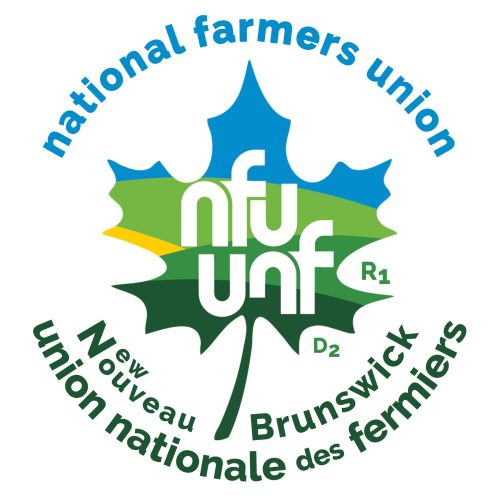Summary of Recommendations from the National Farmers Union in New Brunswick to the Agricultural Land Policy Consultations
These recommendations are part of a complete submission presented to the Department of Agriculture, Aquaculture and Fisheries in December 2015 as part of the Agricultural Land Policy Consultations. To read the entire submission please click here.
Recommendation 1.0: That farmland has inherent value as part of a larger ecosystem; therefore the protection of farmland inherently includes the protection of surrounding forests and waterways. This overarching principle should guide the Agricultural Land Policy and resulting regulations.
Recommendation 2.1: That the land use policy seeks to encourage a diversity of thriving farm businesses rather than vertical business models. The policy shall limit the amount of Crown land made available to vertically integrated companies for their own primary production and processing to avoid corporate monopoly of a certain market.
Recommendation 2.2.1: That the Policy include an inventory of the ownership and control of farmland within its boundaries, and maintain a running inventory by requiring all changes in land tenure and land use to be reported as they occur.
Recommendation 2.2.2: That the Agricultural Land Policy keep farmland in the hands of the people who actually work the land by banning corporate farmland speculation and investment, including pension funds. And that the list of banned entities that can purchase or own farmland be in the Act, but with a provision to add further entities in the regulations as they become relevant.
Recommendation 2.2.3: That the Agricultural Land Policy include specific provisions that limit farmland ownership to Canadians and residents who are actively involved in the operation of the farm-business, and to Canadian-owned companies working in the province.
Recommendation 2.2.4: That the Agricultural Land Policy include a provision in the case where concentration of ownership appears to be undesirable, so that regulation may be introduced to limit farm size that may be owned or controlled by any individual farmer, farm corporation or cooperative farm based on any of the following criteria: a given number of acres, potential productivity of the soil, industry standards for efficiency, negative environmental impact, or a concentration of ownership results in industry monopoly.
Recommendation 3.0.1: All land that is classified as farmland must be protected as farmland with limited options to change the land zoning. Appeals to change zoning must be heard by a provincial board mandated by the Policy to protect agricultural land. Provisions must be set out detailing the procedures in the case of the subdivision of farmland, even if for continued agricultural purposes.
Recommendation 3.0.2: Municipalities, LSDs and the province identify common use corridors for public utilities and subsurface resource infrastructure.
Recommendation 3.1: Prohibit topsoil mining in New Brunswick and seek other solutions to meet urban and industrial topsoil needs.
Recommendation 3.2: The Agricultural Land Policy and resulting regulations must actively promote and reward sustainable and regenerative farming practices.
Recommendation 3.3: Reciprocal respect and enforcement of set-back distances to protect farmers from complaints as well as negative environmental impacts.
Recommendation 4.1.1: A complete overhaul of the Farmland Identification Program that includes annual renewal, as well as changing the benefit from a tax deferral to a tax reduction. For example, a standard reduction to half of the provincial tax rate of $1.4573 per $100.00 of assessed value of registered farmland and farm outbuildings, could be the baseline tax rate for all farmland. To receive an increased reduction or complete elimination of all taxes on farmland, the owner must demonstrate that good soil conservation practices are regularly undertaken. This would provide incentive even for farmland owners who are leasing out their land to neighbours to continue good soil improvement practices. To discourage absentee ownership, we further recommend that land in the FLIP program must be owned or must be farmed by New Brunswick residents to receive any tax reduction.
Recommendation 4.1.2: Re-evaluate the criteria around subdividing lots off of agricultural land while under the FLIP program to meet the new realities of farmers.
Recommendation 4.2: Establish a program similar to the former Land Development Corporation in PEI.
Recommendation 5.0.1: A clear policy and process must be defined for accessing Crown land, so that farmers can easily become aware of parcels approved for lease which are already identified as suitable for a certain type of agricultural production, and determine how to request a Crown land lease and receive a response in a timely manner.
Recommendation 5.0.2: To appoint a DAAF staff person to assist farmers with the process of identifying, applying for and transitioning to a Crown land lease.
Recommendation 6.0.1: That the Precautionary Principle be the overarching principle that informs the Agricultural Land Act and regulations, especially with regard to a request to use farmland for other purposes, including surface and sub-surface resource extraction.
Recommendation 6.0.2: That the board or commission established to implement the Agricultural Land Policy be given a clear mandate to preserve agricultural land, similar to the original mandate of the ALR in BC.




